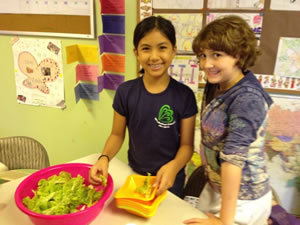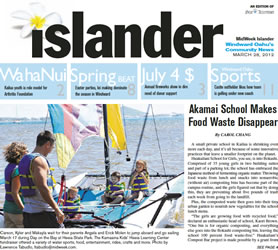Akamai School Makes Food Waste Disappear

Huakailani School students Amelie Avina (left) and Lily Edwards add lettuce harvested from the school’s urban garden — in the parking lot — to the salad they’re making for classmates. Eventually, any food waste will go into the Bokashi bin, be turned into compost and then go back into the ground to nourish more lettuce. Photo from Kaori Brown.
A small private school in Kailua is shrinking even more each day, and it’s all because of some innovative practices that leave a smaller footprint on the planet.
Huakailani School for Girls, you see, is into Bokashi. Comprised of 35 young girls in two building suites and part of a parking lot, the school has embraced the Japanese method of fermenting organic matter. Throwing food waste from lunch and snacks into nonaerobic (without air) composting bins has become part of the campus routine, and the girls figured out that by doing this, they are preventing about five pounds of trash each week from going to the landfill.
Plus, the composted waste then goes into their tiny urban garden to nourish new vegetables for the school lunch menu.
“The girls are growing food with recycled food,” declared an enthusiastic head of school, Kaori Brown. “One bin is for organic composting, and everything else goes into the Bokashi composting bin, leaving the school 100 percent food waste-free.” Huakailani’s Compost Bar project is made possible by a grant from Youth Service Hawaii.
The Bokashi mix of wheat bran infused with microorganisms acts as a fermenter of foods such as meats, cheese, pasta, etc., that cannot be processed in a regular aerobic bin. And it works away with virtually no odor, Brown said.
The girls would like to share their newfound knowledge, lead tours of their composting operations and offer Bokashi-making workshops. This Saturday, they will be at a Service Learning Showcase at Windward Mall from 10 a.m. to 2 p.m. Ask them anything.
For more information, call 263-2020.






